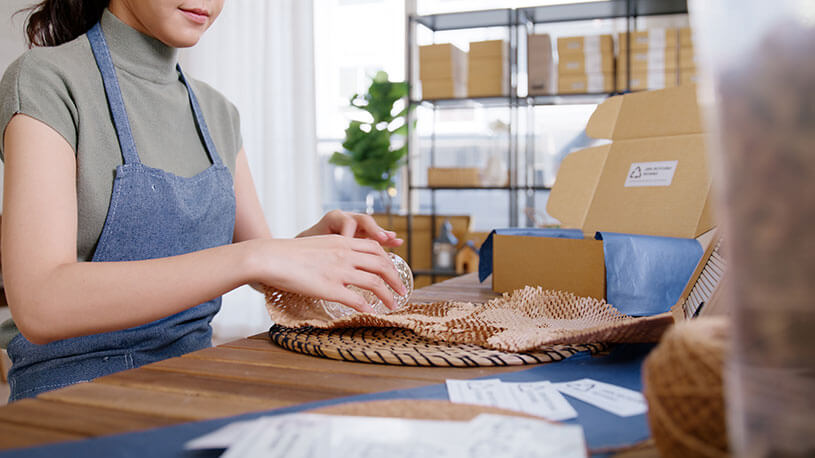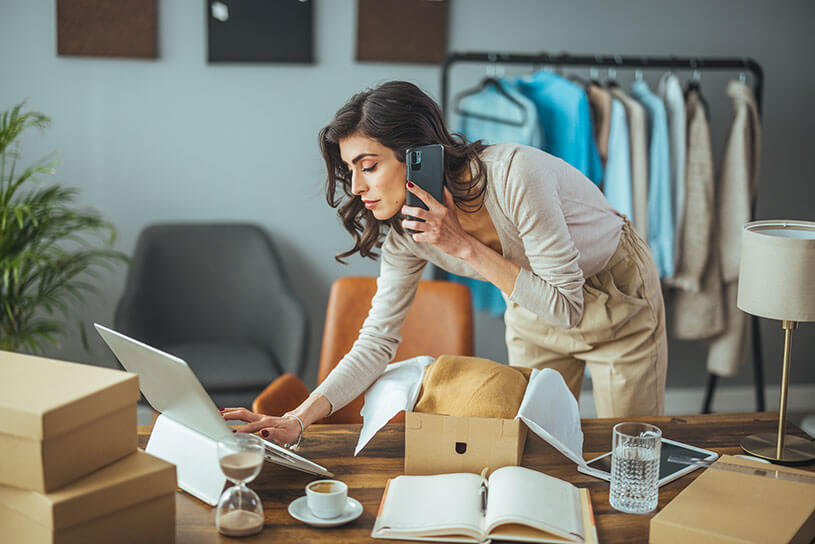What is sustainable packaging? And how do you find environmentally-friendly packaging that isn’t going to impact your profit margin?
As people, government, and organisations are increasingly looking at ways to be more sustainable, small businesses are looking for alternatives to plastic when it comes to packaging.
What’s more, consumers are voting with their wallets when choosing brands that care about the planet. The good news is that eco-friendly materials for food, products, and deliveries are out there – and they needn’t be expensive.
So whether you’re an online retailer or running a takeaway, this guide offers sustainable alternatives to plastic packaging you can use for your small business. As well as tips on what materials to look for and top eco-friendly suppliers, we’ve got stories from real businesses that have put sustainability at the centre of their strategy.
Here’s what we’re going to cover:
- the importance of using sustainable packaging
- tips for finding sustainable packaging
- sustainable packaging for food businesses
- sustainable packaging for products
- real businesses using sustainable packaging
- packaging companies and how to choose a supplier
Importance of using sustainable packaging
Save our planet – the Earth has finite resources so using materials for your single-use packaging that can be recycled or are naturally renewable can reduce your impact on the environment.
Reduce your carbon footprint – the UK has a target to reach net zero by 2050 and all businesses have a part to play in this.
Consumers want eco-friendly packaging – a report from Deloitte found 51 per cent of consumers consider a product ‘sustainable’ if it uses minimal or recyclable/compostable/biodegradable packaging. And 31 per cent would consider this when choosing to buy something.
Brand identity – using excessive packaging can create a negative feeling among consumers, but making conscious choices for the environment can positively demonstrate your sustainable mission and values as a company.
Supports your sustainability goals – 97 per cent of small businesses say they have sustainability goals in place and want to make their business more sustainable.
Save money – saving energy and cutting waste can reduce your costs, and policies such as the plastic packaging tax mean buying recycled plastic will get more expensive.
Read more: How to create an ESG (environmental, social, and governance) strategy
Tips for finding sustainable packaging for small businesses
It can be tricky to know where to start when it comes to finding sustainable packaging solutions for your small business. But the first thing to look at is what your packaging is made of.
Materials should be reusable, biodegradable, or compostable. This reduces the environmental impact in terms of production and cuts the amount of single-use items going straight to landfill.
So whether you’re selling food, drinks, or products, these are the main things to consider when trying to improve the sustainability of your packaging:
- Use the smallest box you can – this makes packaging and deliveries as efficient as possible.
- Source materials that can be easily recycled, such as paper, cardboard, glass, metal, or bioplastics.
- Plant-based packaging made from sugarcane, bamboo, or hemp is naturally renewable so doesn’t drain resources.
- Plantable packaging like seed paper with wildflowers or herbs is compostable and can be enjoyed by your customers afterwards.
- Source from suppliers that are ethical and environmentally friendly in their ethos.
- Consider the environmental impact of your alternative materials to plastic – it’s not always just a case of switching from one to another.
- Avoid PVC and polystyrene packaging.

Hivewrap is a strong, paper-based alternative to bubble wrap. Photograph: ChayTee/stock.adobe.com
As you get further into the process of selecting new packaging materials, you’ll probably want to:
- get samples to find what sustainable packaging is right for your business, and don’t change everything all at once
- review your packaging design to make sure you’re not using any harmful chemicals or adding too much to the packaging that makes it difficult to recycle
- consider introducing a bulk return scheme – customers can send back boxes or containers that can be reused again and again
When reviewing your sustainability goals, it’s important to avoid ‘greenwashing’ and labelling things as eco-friendly when they’re not reducing environmental impact. Always be upfront about where you’re at and humble that there’s still a way to go.
Focus groups and customer surveys can be useful to help you understand if your sustainable packaging is doing its job well or ways you can improve. While considering a circular economy is important when you’re developing a new product, make sure packaging design and the product itself take care to reduce environmental impact wherever possible.
Sustainable packaging for food – examples
If you’ve got a takeaway business or café then thinking about the types of packaging you can use for food and drinks is important. From food containers to drinks cups, the industry can generate a lot of waste as everything is designed to be used once.
But there are sustainable food packaging options out there, including:
- compostable packaging
- glass jars – for example for sauces that can be returned or reused
- biodegradable packaging for food containers (rather than single-use plastic)
- paper bags and straws (rather than plastic)
Avoid PVC, low density polyethylene, and polystyrene as these aren’t easily recyclable or the manufacturing process releases chemicals and can harm the environment.
Food hygiene and safe storage should remain a primary concern when looking at suitable packaging though. And it’s worth noting that the Food Standards Agency (FSA) is currently investigating the safety of products made from bamboo mixed with plastic (items made solely from bamboo are safe however).
Sustainable packaging for products
If you sell products online then finding suitable packaging that protects what’s inside while being durable, affordable, and sustainable is likely a key part of your business strategy.
Sustainable box packaging for online retail businesses includes:
- recycled cardboard boxes
- plastic-free tape
- plastic-free padded envelopes
- compostable/dissolvable packing peanuts
- corrugated packaging
- paper bubble wrap
You could also consider reusable materials like glass jars, metal tins, and fabric bags.
Y.O.U underwear is one small business that’s got sustainability at its heart. Products are made from Fairtrade and GOTS-certified organic cotton and are packaged in reusable organic cotton bags.
The retail brand was awarded a £25,000 grant last year, which the founder Sarah Jordan said at the time would enable them to “implement our long-held dream of a fully circular fibre-to-fibre recycling programme.”
Real businesses – sustainable packaging examples
Here’s a few examples of brands that boast sustainable packaging as part of their mission:
Who Gives A Crap – deliveries are carbon neutral and packaging is plastic-free with playful messaging on the box.
CanO Water – avoids single-use plastic by selling water in resealable cans.
Keep Candles – this candle company tackles the single-use element of the industry by making candles in a container that can become a mug after the candle has burned.
For peats sake! – packages environmentally friendly peat as small as possible, to save on large boxes making deliveries as efficient as possible.
Olivia, Co-Founder at Keep Candles shared their sustainability mission with us: “We create dual purpose candles that can be used again and again. Sustainability has to be at the heart of our business so we only use natural plant-based wax, 100 per cent pure essential oils and eco-packaging.”
Read more: How to set up an online shop – a step-by-step guide
Sustainable packaging companies – how to choose a supplier
A B Corp accreditation is one positive indicator that a business is doing its bit for the planet. With that in mind, we’ve looked at packaging suppliers that have achieved this status to help you find sustainable packaging companies for your business needs:
- Better Packaging Co – affordable and innovative eco-packaging for businesses of all sizes
- Grounded – sustainable packaging for food and ecommerce businesses
- The Wool Packaging Company – a UK business offering temperature controlled packaging, and Woolcool Insulated Packaging as an alternative to polystyrene
- Swiftpak – sustainable packaging options for home products, electricals, and food and drink
If you’re looking for sustainable cardboard packaging and cartons, these companies are B Corps too:
- Priory Direct – a carbon neutral company with sustainable boxes from responsibly managed forests
- Reusabox – embraces circular economy principles by selling recycled and used boxes from organisations and brands
- Curtis Packaging – UK carton manufacturer with sustainable packaging, including vegetable/soya based inks as a cleaner alternative to oil-based ones
No quick fix, but important to start somewhere
Packaging can’t be considered in insolation when on your sustainability journey – but it’s a start. The packaging materials, the environmental impact of creating it in the first place, and the waste it creates afterwards are all areas that can have an impact on the planet. Whatever you do, it’s important to explore different options, speak to your customers, and find what’s best for your business and your budget.
How are you getting on finding sustainable packaging materials for your small business? Let us know in the comments below.
Read more small business guides
Ready to set up your cover?
As one of the UK’s biggest business insurance providers, we specialise in public liability insurance and protect more trades than anybody else. Why not take a look now and build a quick, tailored quote?
Photograph: Dragana Gordic/stock.adobe.com
